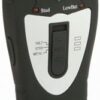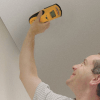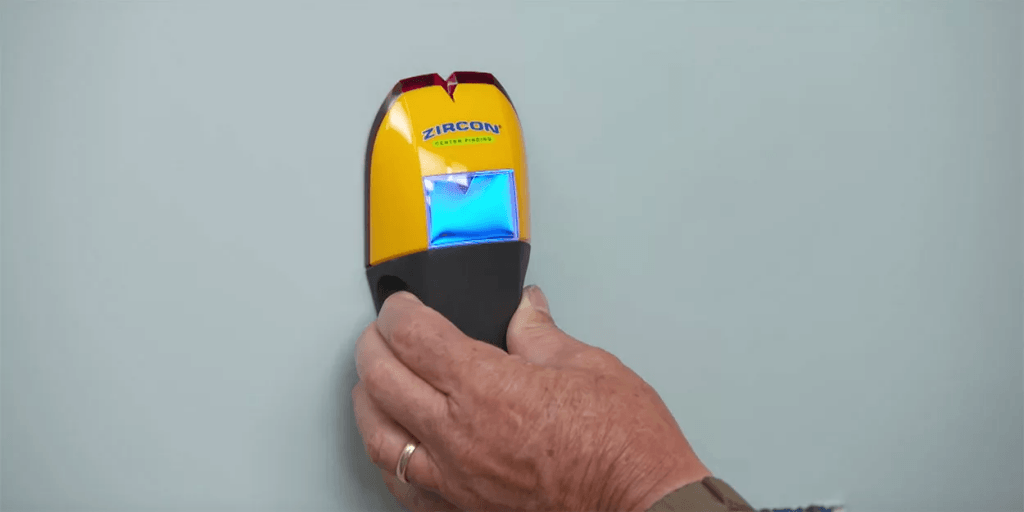
Fixing up or making new installations in your antique home should not be as big a challenge as it is. The best stud finder for old homes, which this article looks into, could be the solution for your needs.
Introduction
Making renovations, repairs, or new additions can help you raise the value of your old home, or even make it more comfortable for you. It can be a very challenging and delicate task, due to the fragile nature of some components. Finding the arrangement of studs might also be tougher than it could be for newer homes, since housing plans have changed slightly and any approximations might be off.
The best stud finder for old homes will need to deliver highly accurate output, and should work well on inconsistent surfaces. A great option for your needs should be comfortable, easy to use, and up to par with your expectation in terms of detection capacity. These are some of the best stud finders for old homes you could consider.
Comparison Table
| stud finder | Type | Check on Amazon |
|---|---|---|
| Zircon 68314 stud finder | Electronic | Check Price . |
| Precision Sensors 962682 scanner | Electronic | Check Price . |
| Bosch D-Tect 120 stud finder | Electronic | Check Price . |
| Craftsman CMHT77623 stud finder | Electronic | Check Price . |
| AOM WSTS002 scanner | Electronic | Check Price . |
| Hanson CH magnetic stud finder | Magnetic | Check Price . |
| Studpop 100480 SP stud finder | Magnetic | Check Price . |
| Dewalt DCT419S1 stud finder | Electronic | Check Price . |
Best Stud Finder For Old Homes
Zircon 68314 stud finder
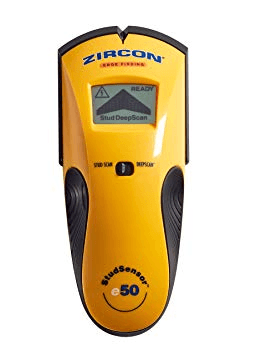
Our first pick, the Zircon 68314 stud finder is a highly useful and feature rich option that will work well with older homes. The friendly priced option will help you find stud center, as well as avoid live wires. It is a great option for both a professional and home setting, due to its increased versatility and quality output.
This stud finder will work just as well on different surfaces, thanks to a healthy detection depth. It is very easy to calibrate and use.
Pros
- Quick calibration for a hassle free process
- Easy to use and understand
- Offers a range of features an scanning modes for added value.
Cons
- Limited LCD vertical angles
- May be extra sensitive to rotation when in use
View price on Amazon
Precision Sensors 962682 scanner
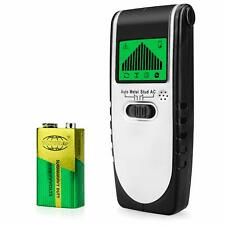
A second value pick with a comparable track record, the Precision Sensors 962682 stud finder will deliver the performance of much higher-end models. It is very accurate, and will work well across multiple surfaces. You can locate studs quickly and easily, thanks to the seamless interface and accurate output.
It has a decent detection depth, and will provide a great option for models within its range. This stud finder could help lighten the load for home maintenance, installations, and repairs.
Pros
- Very easy to use and understand
- Highly accurate detection
- Great detection depth
Cons
- Not as detailed as other models in presentation
View price on Amazon
Bosch D-Tect 120 stud finder
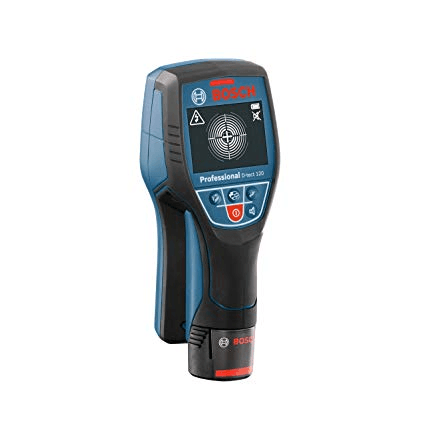
The battery powered Bosch D-Tect 120 is a high quality pick that will find studs, live wires and different components. This versatile model will work well on your old home’s floors, ceiling, and walls, regardless of the materials used. It will penetrate thicker surfaces thanks to an impressive detection depth. It also delivers high accuracy levels, which makes it ideal for different applications.
The stud finder offers a steeper learning curve than most, but you should be able to get the hang of it after going through the manual and video tutorials.
Pros
- Multi-functional tool for a variety of needs
- Works well across different surfaces
- Impressive detection depth
- Easy to use
Cons
- Doesn’t feature a Bosch rechargeable battery
View price on Amazon
Craftsman stud finder
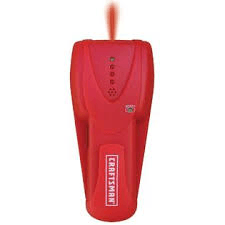
Packed with many great features, the Craftsman stud finder is a great pick for its accuracy and alert options. When you find a stud, this scanner will shine a light on the target to indicate it. You will no longer need to make holes into your surfaces to test for studs, thanks to the heightened accuracy and impressive detection depth on offer. It has 4 modes for added versatility, allowing different applications in your home.
Pros
- Deep scan feature for added benefit over thick surfaces
- Features LED lighting alerts
- Multifunctional scanner offers great value
Cons
- Lacks the standout features of similarly high end models
View price on Amazon
AOM WSTS002 scanner
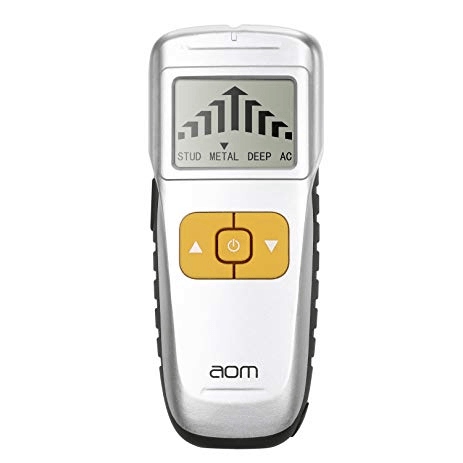
While it has faced some criticism for its simple build and design, the compact AOM WSTS002 scanner is a handy performer that will meet your needs in a home setting. Alongside stud detection, this scanner also features wire, wood, and metal detection. It has a stunning range of features compared to similarly priced models, which makes it a value buy. It will deliver great results with the right use.
A few customers have complained about the model’s likelihood to show up false positives, although this is rare and most likely to occur on very thick surfaces. When working on tiles or outside walls, as well as other heavily padded surfaces, you should consider double checking to ascertain the accuracy of your findings.
Pros
- Multi-scanner offers increased versatility
- Budget friendly option is a value for money buy
- Quality stud finding output
Cons
- May experience more false positives than some models featured
View price on Amazon
Hanson CH magnetic stud finder
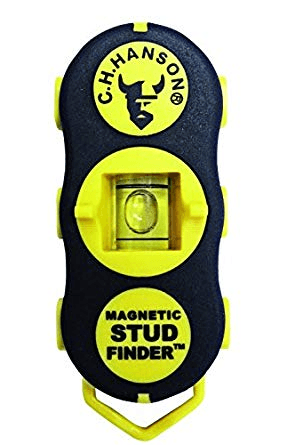
A magnetic option might be limited when it comes to old homes unless it offers a very powerful magnet, which is exactly what attracts us to the Hanson CH stud finder. This simple and easy to use tool will detect studs in some impressive depths for a magnetic scanner, earning its rightful spot on our list. It is also very budget friendly and easy to use, since it requires no calibration. If you are looking for a low-tech model that delivers high end output, this model could be ideal for you.
Pros
- Easy to set up and use
- Affordably priced option
- Highly accurate magnetic stud finder
Cons
- Does not offer a variety of feedback options
View price on Amazon
Studpop 100480 SP stud finder

A second magnetic stud finder, the Studpop 100480 SP is a handy tool that will deliver great results for your home. It is not ideal for professional and heavy duty work due to its limited feedback options and inefficiency when used for large amounts of work. Still, this model will sufficiently meet your expectations in a home setting.
The StudPop scanner features a popper that helps to identify studs. It will work well overall, but may be challenging to use on bumpy surfaces. Like the Hanson CH stud finder, it can be a great option for people looking for a budget friendly alternative to higher end electronic stud finders.
Pros
- Very easy to use
- Requires no calibration
- Fairly priced but offers a great output
Cons
- Doesn’t offer a variety of feedback options
- Will struggle on inconsistent surfaces
View price on Amazon
Dewalt DCT419S1 stud finder
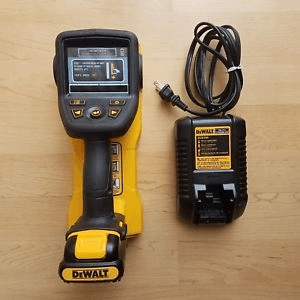
The largest model on our list, the Dewalt DCT419S1 stud finder is a slightly bulky tool that will deliver a professional level performance. This stud finder will work well for old homes regardless of the surface material. It can be too big to fit in compact spaces, which limits its efficiency in some situations.
This stud finder will deliver a great performance and ensure you can accurately catch the readings thanks to the largest LCD screen for any stud finder we have looked into. It will take a little more effort than compact models to use, but it can be an efficient model that will serve you just as highly as some of the higher end options.
Pros
- Powerful performer
- Provides comprehensive data for higher accuracy
- Largest display screen for any model featured
Cons
- Might be too bulky for work in tight spaces
View price on Amazon
What Do You Need To Look For In A Stud Finder?
Are you looking for the right stud finder for your old home? There are so many options available that you might find it difficult to find a model that suits your needs. Whether you are taking up frequent repairs, want to install new fixtures, or are considering hanging a picture or two, finding the right model for your property will be key to extending its life.
It is always important to keep in mind that even the most expensive stud finder will be cheaper than carrying out structural repairs brought about as a result of inaccurate placement of fixtures or even poor nailing when setting up.
Have a stud finder handy before you even consider making any changes to your old home. If you are looking for the best stud finder for your needs, here are some of the key factors that could shape your judgement.
Frequency of use and work surfaces
How often do you intend to use your stud finder? What surfaces will you be working on? These two questions will help you find a powerful enough model for your needs that offers value at purchase. You do not want to spend too much on a stud finder that is barely used. You also want to avoid a model that will fail to meet your expectations in terms of performance over your desired work surfaces.
If you will be using your stud finder for detailed professional tasks in a range of surfaces, it is best to consider the more versatile and powerful options. For home use, choosing an easy to manage model that is affordably priced and which ensures sufficient performance could be the way to go.
Display and alert options available
Does your stud finder have an LCD or LED display? How much data should it provide? The right stud finder for your needs will depend on the scope of use. A highly detailed display could be helpful for regular and heavy duty use. It may be an inefficient option for hanging pictures on your walls. Understanding the right display for you will help you choose between different models for a simple, detailed and precise display.
When it comes to alert options, you should generally consider stud finders which offer sufficient feedback in the event of detection. This should be unambiguous and consistent, allowing you to find the exact positioning of your targets. Some models may even feature a signal for even more precise detection.
Type of stud finder
There are two basic types of stud finders, based on operation. Stud finders may either be electronic or magnetic. Magnetic models rely on powerful rare earth magnets to detect metallic components beneath your surface. Electronic stud finders rely on the electrical field, which they use to map out all the necessary components.
Magnetic stud finders are usually more affordable than electronic stud finders. They lack the range of features offered, which could be one reason why the alternative is so popular.
A third type of stud finder is making ground on these models, although it is still too high end to access for most. Radar detection stud finders use wave technology to assess the composition of surfaces. These stud finders transmit waves through your surface of interest, which may be reflected by interior components. The delay in feedback enables the model to map out the internal structure of your surface for a quick and highly precise output.
Final Word
While it lacks the high quality rechargeable Bosch battery that is common with some of the brand’s products, the twin AA battery-powered Bosch D-Tect 120 is our top pick for old homes. This stud finder is very well built, and is designed to fit on your hand for a hassle free process. It is lightweight, and includes a number of detection modes for different needs.
It will work just as well on lath and plaster as it would on tile and drywall. With a stud detection depth of up to 6 inches, your antique home will not be a problem for this powerful performer. The reliable stud finder may feature a longer learning curve for beginners due to the range of features and presentation options, but it can be a great model for when you get used to it.
If you are looking for the best scanner and stud finder for your home, you may consider trying out the Bosch D-Tect 120.
